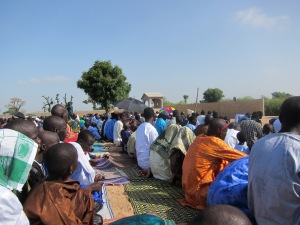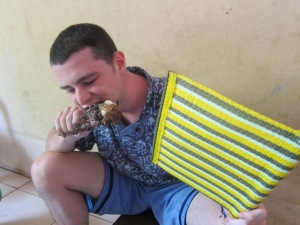“Come, Eli, we schhk the xar now,” my host brother said, sliding a finger across his throat at the schhk sound. We communicate quite effectively through a combination of English, French, Wolof and hand motions. Xar (the ‘x’ is pronounced like the ‘ch’ in Channuka) is the Wolof word for sheep, and it has been one of the words I’ve used most often while in Senegal. Both of my host families–the one in the capital city of Dakar and the one in my more rural site, Pire Goureye–keep sheep pens in the house. I was told that I would wake up every morning to the call to prayer, but the xar bleats usually start before the Allah hu akhbar’s. My Dakar family even named a lamb after me because it was born the day I arrived. Xar seem to keep coming up throughout my experience here, most notably yesterday when I witnessed not one but two sheep being slaughtered and disassembled for the Muslim holiday of Eid Al-Adha, or Tabaski, as it’s called here in Senegal.
My brother made the schhk sound, and told me to come out to the yard. There, my other host brothers lead a struggling sheep out of the pen and forced it down onto its side, baring its neck. I did not know what to expect when the knife cut through the animal’s throat, having never before seen a partially severed head on any mammal. I hoped to hide my apprehension behind a placid face, but my brother, Ibou Laye, put his hand to my chest and felt my pounding heart. He laughed and asked why I was scared. “It’s natural” he said.
My host father probed the ram’s throat for a jugular vein and swiftly sawed through fur, muscle and other stringy tubey stuff that I couldn’t name. Thick blood leaked onto the sand. I found that once the cut had been made I felt calm. My dad walked away to say a quiet prayer while my brothers held the seizing animal still to die. I’m usually not one for prayer, but while in Senegal I’ve frequently said the shehekiyanu, a thank-you to God for bringing me safely to the present moment that Jews say when going through a new experience. More often than not, I force myself to say the shehekiyanu when the Jew in me would rather declare a hefty Oy Vey at the difficulty of a situation, but the optimist in that Jew recognizes how lucky I am to experience so much that is new and different. When I’m dripping sweat in my sauna of a room, a blackout halting my fan and the busted water line into Dakar keeping me smelly and dehydrated, for example, I’ll force myself to be thankful rather than complain. Same thing when a group of fifty ragged children outside my town’s soccer stadium are staring at me, the only white person for miles around and the first white person many have ever seen, like I’m the pre-game entertainment. When oy vey comes to my lips, shehekiyanu is what I say. So while I watched the blood pool on the ground, and couldn’t keep my eyes off the twitching red tubes still trying to fulfill their bodily function, I let out a sigh and said to myself, “Baruch atah adonai, eloheinu melech ha’olam, shehechiyanu, ve’ki’eh’manu, ve’higey’anu la’zman hazeh”: Blessed are you, lord our god, ruler of the universe, who has granted us life, sustained us, and enabled us to reach this moment. (translation courtesy of Wikipedia)
Back home I’m about as secular a Jew as a Jew can be. My family’s synagogue attendance was limited to high holidays for many years, but I always brought a book to read while lying down in the pews, and my parents complained that our rabbi sounded too “preachy”, so even those visits came to an end. A recent Pew survey found that more than half of Jews living in the US have doubts about the existence of God, and that only 1% of those surveyed identify with judaism because of a belief in God. Cultural rather than spiritual affinity sustains the modern Jewish population in North America, and I am a proud part of that shift away from tradition. Latkes and Maneschewitz wine are more important to me than God. But I would never say so in my Senegalese household, even if I knew the necessary Wolof.
Global Citizen Year, the program through which I’ve found myself spending the better part of a year in Senegal, asks us to adopt a religion to better enter into our communities, even if we are areligious or secular in the States. 96% of Senegal is Muslim, 4% Christian, and an uncounted, insignificant number atheist or agnostic. People here accept and respect all religions, but generally do not accept a lack of religion. I thought that feigning spirituality would be a simple matter of telling people that I am Jewish, but it has, in fact, become a much more involved bit of truth-bending. I explained to my host brother, again in a mix of English, broken French, broken Wolof, and hand gestures, that my conception of god is based in science: in the relationships between particles and in entropy, rather than in a conscious, decision making higher power. But he still insists that I agree with him when he tells me that God is great, and he says the Arabic for ‘God willing’ every time I talk about doing something in the future. The many residents of Pire Goureye who would seek to convert me to Islam ask why I am Jewish. In these cases I suppress the accurate answer about potato pancakes and tell them that my family has been Jewish for generations, that I am happy with my religion. No other conversation makes me feel like more of an outsider.
Back to the xar. As I watched my friend, Mame Cheikh cut open the dead sheep’s belly and expertly separate fur from innards, I wondered how different I really am from these devout muslims, being a cultural rather than a God-oriented Jew. I had thought the act of slaughtering a sheep so traditional, so–I’m ashamed to say–archaic, that it must require a belief in some conscious being watching your every move from the sky. But Mame Cheikh laughed and joked and made casual conversation while breaking the sheep’s legs with a machete, cutting through testicle, and even while emptying the remaining contents of the sheep’s digestive track (at what point in the system is food no longer food? Is there a line in the throat or stomach or intestine past which ingested substances should be labeled ‘poop’?) into a hole dug in the dirt. I expected a solemn, silent reverence for the task–a face and attitude acknowledging the spotlight God was shining on his every move. But as he separated the animal into its parts–putting organs into one bowl, cuts of meat into another like a careful child putting away Legos–I started to think that maybe my beliefs and his are not so different. The only reason I see a difference between the spiritual and the cultural aspects of religion is because I’ve always been taught to question the existence of God. There is no such separation within Senegalese Islam. Spiritualism here, unlike in the US, is an unavoidable, enjoyable part of the culture. Believing in God here isn’t something people do despite opposition to the viewpoint, rather it is as much a part of the culture as eating meals around a communal bowl or shaking hands with everyone on the street. Mame Cheikh and I are both just sticking to the culture of our respective religions; the only difference is that God is a part of his religion’s culture and God has been phased out of my religion’s culture.
The similarity leads me to believe that there is, in fact, just as much questioning in Senegalese Islam as there is in North American Judaism. Starting with the fact that God does exist does not stop one from pondering God’s nature. An atheist in the US might believe that the Big Bang set off a swirl of physical and chemical activity and that life is a random byproduct of chemicals bumping into each other for billions of year. A devout muslim here might believe exactly the same thing, but say that God is behind the Big Bang, or that God is the Big Bang, or that God is the incipient universe. One tenet of Islam is that God goes by any names. This, I think, is not for the sake of addressing a conscious being but to allow God to exist in many different forms. So where religion used to make me feel like an outsider here, I’m now comfortable repeating Inshallah after my brother when we talk about tomorrow. I know that our beliefs are not necessarily so different. We just like to use different words.


